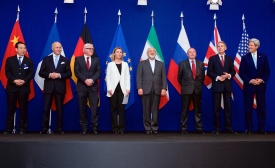foreign policy

The Israeli campaign could be seen as classic public diplomacy – a government reaching out directly to a foreign public – or it could be seen as inappropriate interference that could produce an anti-Israel backlash. This is a line public diplomats should be wary about crossing. Even in the world of hardboiled foreign affairs, subtlety and restraint have value.
The outstanding question is: How should the United States become involved in the internal affairs of other countries? If there is a clear lesson from the two Gulf wars, it’s that we should stay out of the business of invasion and occupation.
Donald Trump said Mexican leaders were outsmarting their American counterparts by shipping the country’s criminals over the border. Former Florida Gov. Jeb Bush said beating the Islamic State depended on first defeating President Barack Obama’s Iran deal. Texas Sen. Ted Cruz accused the chairman of the Joint Chiefs of Staff of speaking “nonsense.”
China’s “resource-diplomacy” strategy, promoting closer ties with Arctic states, aims to boost trade, commerce and scientific cooperation, evidenced by what The Diplomat called “China’s pivot north and Russia’s pivot east.”
But with 998,000 overseas foreign workers in 2014, according to the Chinese Ministry of Commerce, China has slowly come to realize that operating globally means indeed greater risk and the requirement therein to protect both its foreign nationals and overseas investments. To this end, China has increasingly felt the pressure of being in the middle of potentially hostile territory throughout the Middle East and Africa.
The author also advocates for the revision and restart of India’s Look North Policy which is under hibernation since decades. India as a major regional and global power cannot leap-frog to the global high table without demonstrating effective and timely initiatives at the regional level, and Central Asia is an important constituent of this region.
China has been making major efforts to increase its ability to influence other countries without force or coercion. [...] China has emphasized its cultural and economic strengths, but it has paid less attention to the political aspects that can undermine its efforts.







